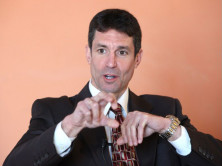Damon Kiesow, pictured above, explained his preference is to leave inaccurate tweets up and issue a separate correction. (Credit: Twitter)
Should news organizations delete the inaccurate information? Or should they issue a correction tweet? iMediaEthics has written about this topic before (see here). But we also sent out e-mail inquiries to digital media experts to see what they think about Twitter ethics.
After the Tuscon, Arizona shooting in January that left six people dead and Congresswoman Gabrielle Giffords “seriously wounded,” news organizations struggled with that question because many — notably Reuters and NPR — had inaccurately reported via Twitter that Giffords had died.
Damon Kiesow, currently a digital media fellow at the Poynter Institute, explained via e-mail to iMediaEthics that his preference is to “leave the old tweets as-is and simply send a correction noting that it is a corrected update.”
See below a question-and-answer with Kiesow via e-mail from last month:
iMediaEthics: Given that Twitter’s users are most likely not largely journalists, do you think there is an actual chance that Twitter would develop any features such as editing, corrections and strikethroughs?
Kiesow: “I can’t guess how quickly Twitter might address the issue, but I think as one of the new ‘gatekeepers’ of news and conversation they have some responsibility here. I would be surprised if it is something they are not already discussing. It seems like a needed tool, much like how they offered ‘verified’ identities for a while to try and solve that challenge. Their Annotation tools seems like it might be applicable to this problem, but it hasn’t been released yet.”
iMediaEthics: How would you advise journalists to be most transparent in Twitter corrections?
Kiesow: “I don’t see any difference between old/new media in terms of transparency and corrections. NPR’s Andy Carvin did a great job during the Gifford coverage correcting the error and explaining his actions at length. Transparency just means being honest with yourself and your audience. When mistakes are made just explain them and fix them. If the mistake calls for some later examination of internal policies, be upfront about that with readers as well.”
StinkyJournalism: As a digital media expert, how do you advise journalists responsibly, carefully and ethically use social media to communicate with and inform readers?
Kiesow: “Social media does not require new ethical rules in terms of how we use it to cover news. If we are following core journalism values and sincerely engaging with readers, we are 90 percent of the way there. The trick is developing best practices that help us apply those ‘old’ values onto new, speedier, digital platforms.”But, we do need to place our values at the core of how we think about our jobs, and make the tools serve those needs, rather than the other way around.”
Kiesow also passed on a link to this ZombieJournalism article, which offers an “accuracy and accountability checklist for social media.”
iMediaEthics also heard back from BreakingNews’ Cory Bergman, director of new product development. Bergman is also a contributor to LostRemote.
We had written to BreakingNews to see how they handled their incorrect tweet reporting Giffords’ death.
According to Bergman, “@breakingnews is a real-time curated feed of breaking news. We distribute what trustworthy news organizations report, carefully attributing and (when available) linking the source story.”
In the case of BreakingNews (twitter.com/breakingnews), Bergman explained “we usually write our own tweets.” However, during the reporting of the Tuscon shooting in January, BreakingNews “retweeted the Reuters tweet verbatim.” That tweet read:
“RT: @Reuters: FLASH: Congresswoman Gifford dies after being shot in the head at public appearance in Tucson, Arizona.”
BreakingNews re-tweeted the Reuters post “since we didn’t have an independent confirmation of the Reuters report.” Even though the tweet reporting Giffords’ death was inaccurate, BreakingNews didn’t delete the tweet “to maintain full transparency with our audience,” and later tweeted: “Update: Conflicting reports about Giffords – Reuters now reporting she’s alive and in surgery.”
ZombieJournalism’s “Accuracy and Accountability Checklist”
ZombieJournalism compiled a list of questions for journalists to ask themselves before sharing information on social media networks like Twitter and Facebook. Many of the questions are the same as traditional fact-checking questions, such as “how do I know this information?”
Other questions are more specific to social media. For example, “check to see if auto-correct changed the text intended” and “check your shorthand and contractions to make sure they make sense.”
Another interesting tip from ZombieJournalism involved re-tweeting, or when a Twitterer forwards another user’s post. “Is this tweet short enough to be easily re-tweeted?” ZombieJournalism asked. When shortening other people’s’ tweets, there is always danger of losing context that results in inaccuracy.
See the whole post here.






